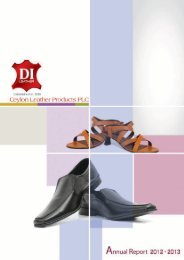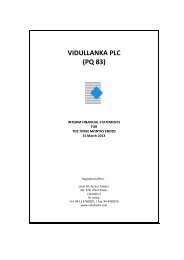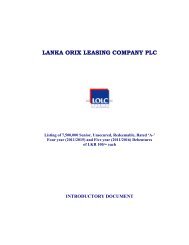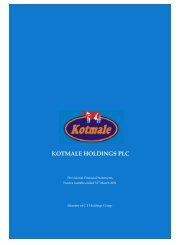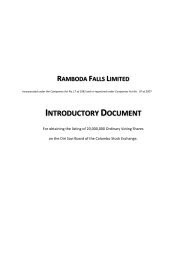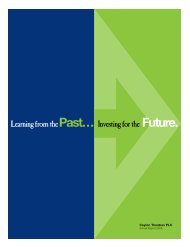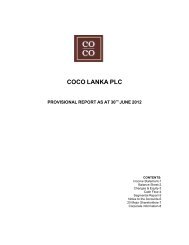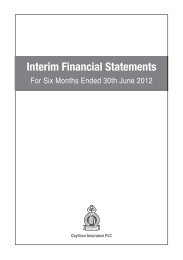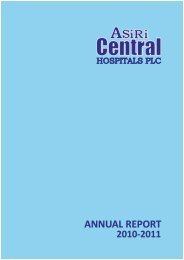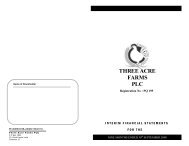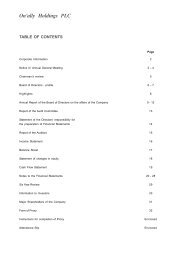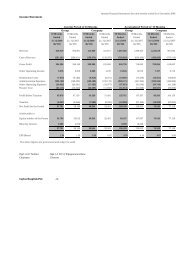Annual Report 2011/2012 - Colombo Stock Exchange
Annual Report 2011/2012 - Colombo Stock Exchange
Annual Report 2011/2012 - Colombo Stock Exchange
Create successful ePaper yourself
Turn your PDF publications into a flip-book with our unique Google optimized e-Paper software.
MERCANTILE SHIPPING COMPANY PLC<br />
24<br />
NOTES TO THE FINANCIAL STATEMENTS Contd...<br />
Year ended 31 March <strong>2012</strong><br />
2.4.14 Revenue Recognition<br />
Revenue is recognized to the extent that it is probable<br />
that the economic benefits will flow to the Company and<br />
the revenue and associated costs incurred or to be<br />
incurred can be reliably measured. Revenue is<br />
measured at the fair value of the consideration received<br />
or receivable net of trade discounts and sales taxes.<br />
Group turnover represents the amounts derived from<br />
the provision of services to customers outside the<br />
Group, which fall within the Group's ordinary activities<br />
net of Value Added Taxes and trade discounts.<br />
The following specific criteria are used for the purpose<br />
of recognition of revenue.<br />
a) Freight Income<br />
Income from voyage charter is recognized when a<br />
voyage is completed based on the complete discharge<br />
of cargos at the last port of call whilst income from time<br />
charter is recognized over the period of the time charter<br />
agreement on an accrual basis. Any losses arising from<br />
voyage or time charters are provided for in full as soon<br />
as they are anticipated.<br />
b) Rental Income<br />
Rental income arising on investment property is<br />
accounted for on a straight-line basis over the lease<br />
terms.<br />
c) Interest<br />
Revenue is recognised on a time proportion basis that<br />
takes in to account the effective interest rate on the<br />
asset.<br />
d) Others<br />
Net Gains and losses of a revenue nature on the<br />
disposal of property, plant and equipment and other<br />
noncurrent assets including investments have been<br />
accounted for in the income statement, having<br />
deducted from proceeds on disposal, the carrying<br />
amount of the assets and related selling expenses.<br />
2.5 SRI LANKA ACCOUNTING STANDARDS ISSUED<br />
BUT NOT YET EFFECTIVE<br />
The Group will be adopting the new Sri Lanka<br />
Accounting Standards (new SLAS) comprising LKAS<br />
and SLFRS applicable for financial periods<br />
commencing from 01 January <strong>2012</strong> as issued by the<br />
Institute of Chartered Accountants of Sri Lanka. The<br />
Group has commenced reviewing its accounting<br />
policies and financial reporting in readiness for the<br />
transition. As the Group has a 31 March year end,<br />
priority has been given to considering the preparation<br />
of an opening balance sheet in accordance with the<br />
new SLASs as at 01 April <strong>2011</strong>. This will form the basis of<br />
accounting for the new SLASs in the future, and is<br />
required when the Group prepares its first new SLAS<br />
compliant financial statements for the year ending 31<br />
March 2013. Set out below are the key areas where<br />
accounting policies will change and may have an<br />
impact on the financial statements of the Group. The<br />
Group is in the process of quantifying the impact on the<br />
financial statements arising from such changes in<br />
accounting policies.<br />
(a) SLFRS 1 – First Time Adoption of Sri Lanka<br />
Accounting Standards requires the Group to prepare<br />
and present opening new SLFRS financial statements<br />
at the date of transition to new SLAS. The Group shall<br />
use the same accounting policies in its opening new<br />
SLAS financial statements and throughout all<br />
comparable periods presented in its first new SLAS<br />
financial statements.<br />
(b) LKAS 1 – Presentation of Financial Statements<br />
requires an entity to present, in a statement of changes<br />
in equity, all owner changes in equity. All non owner<br />
changes in equity are required to be presented in one<br />
statement of comprehensive income or in two<br />
statements (a separate income statement and a<br />
statement of comprehensive income). Components of<br />
comprehensive income are not permitted to be<br />
presented in the statement of changes in equity. This<br />
standard also requires the Group to disclose<br />
information that enables users of its financial<br />
statements to evaluate the entity's objectives, policies<br />
and processes for managing capital.<br />
(c) LKAS 16 – Property Plant and Equipment requires a<br />
company to initially measure an item of property plant<br />
and equipment at cost, using the cash price equivalent<br />
at the recognition date. If payment is deferred beyond<br />
normal credit terms, the difference between the cash<br />
price equivalent and the total payment is recognized as<br />
interest over the period, unless such interest is<br />
capitalized in accordance with LKAS 23 Borrowing<br />
Costs.<br />
All site restoration costs including other environmental<br />
restoration and similar costs must be estimated and<br />
capitalised at initial recognition, in order that such costs<br />
can be depreciated over the useful life of the asset.<br />
This standard requires depreciation of assets over their<br />
useful lives, where the residual value of assets is<br />
deducted to arrive at the depreciable value. It also<br />
requires that significant components of an asset be<br />
evaluated separately for depreciation.<br />
(d) LKAS 32 – Financial Instruments: Presentation,<br />
LKAS 39 – Financial Instruments: Recognition and<br />
Measurement and SLFRS 7 – Disclosures will result in<br />
changes to the current method of recognizing financial





